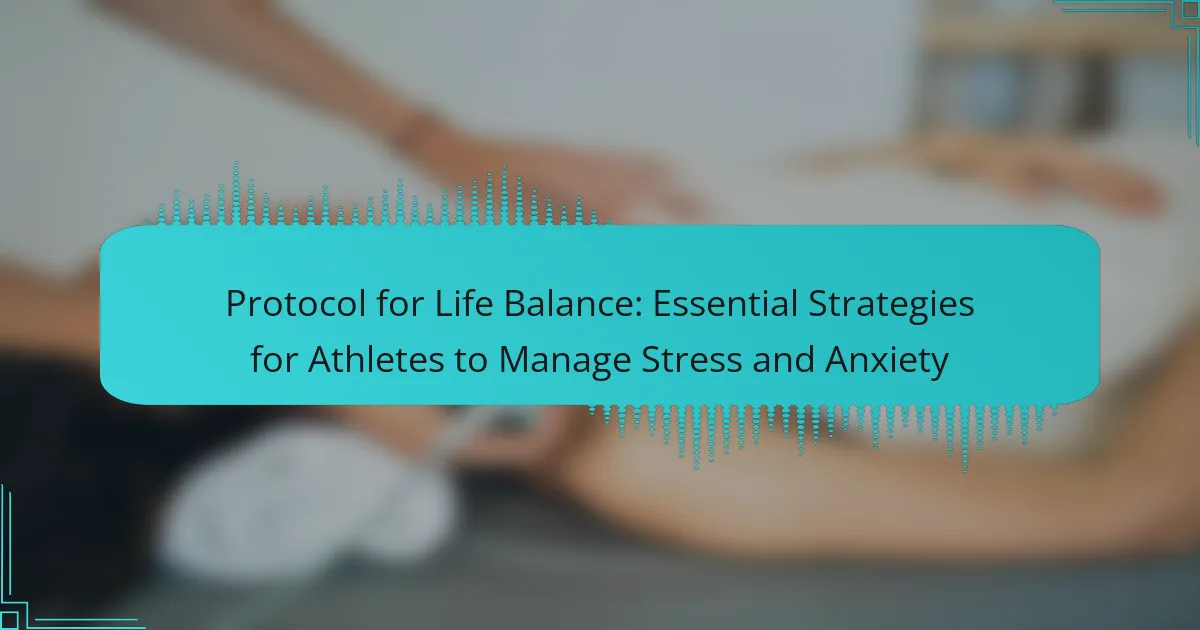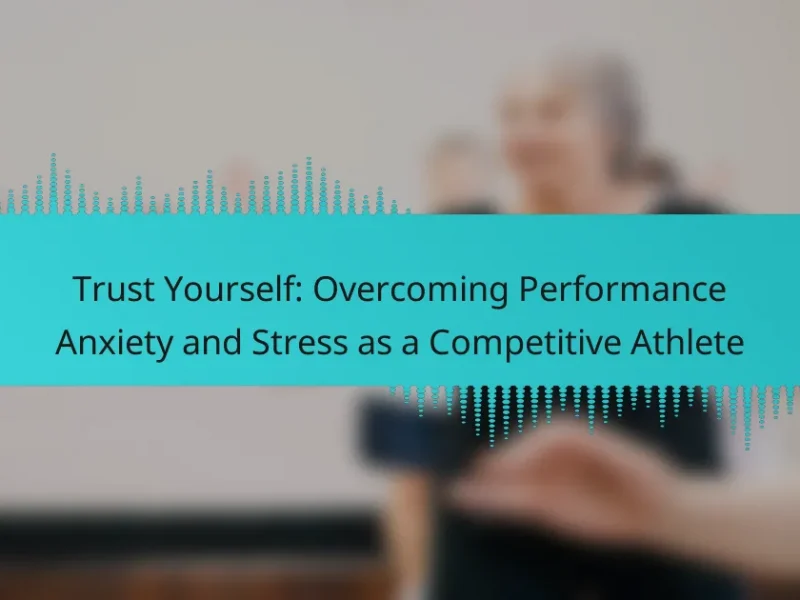Managing stress and anxiety is crucial for athletes to perform at their best. The Protocol for Life Balance offers strategies like mindfulness practices, structured routines, and physical recovery techniques. These methods enhance mental clarity, emotional stability, and overall well-being. Implementing tailored techniques can significantly improve an athlete’s performance and resilience.

What is the Protocol for Life Balance for athletes?
The Protocol for Life Balance provides athletes with strategies to effectively manage stress and anxiety. Key elements include time management, mindfulness practices, and physical recovery techniques. These strategies help athletes maintain mental clarity and emotional stability. Research indicates that athletes who implement these practices experience reduced anxiety levels and improved performance.
How does stress and anxiety affect athletic performance?
Stress and anxiety negatively impact athletic performance by impairing focus, reducing stamina, and increasing the risk of injury. Athletes often experience decreased motivation and heightened fatigue under stress. Chronic stress can lead to physical symptoms, including muscle tension and fatigue, which hinder performance. Research indicates that effective stress management strategies, such as mindfulness and structured training routines, can enhance mental resilience and improve overall performance outcomes.
What are the common sources of stress for athletes?
Common sources of stress for athletes include competition pressure, training demands, injury concerns, and balancing personal life. These factors can significantly impact mental health and performance.
Competition pressure arises from the expectations to perform well, often fueled by external and internal motivations. Training demands can lead to physical exhaustion and burnout, especially when athletes push their limits. Injury concerns create anxiety about performance and future participation in sports. Balancing personal life with athletic commitments can lead to feelings of isolation and overwhelm.
Addressing these stressors through effective management strategies is crucial for maintaining overall well-being and performance.
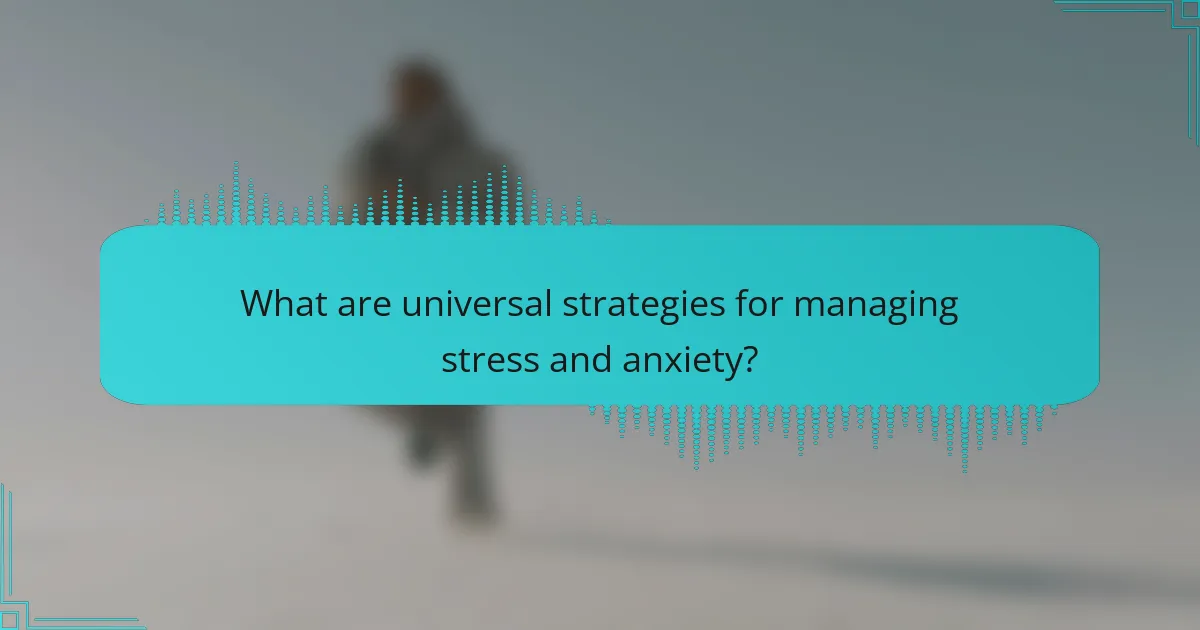
What are universal strategies for managing stress and anxiety?
Effective strategies for managing stress and anxiety include mindfulness, physical activity, and structured routines. Mindfulness practices, such as meditation, enhance focus and reduce tension. Regular physical activity, like aerobic exercises, releases endorphins, improving mood and resilience. Establishing structured routines fosters a sense of control and predictability, which can alleviate anxiety. Incorporating these strategies into daily life promotes overall well-being and mental balance for athletes.
How can physical training support mental health?
Physical training significantly enhances mental health by reducing stress and anxiety. Regular exercise releases endorphins, which improve mood and promote relaxation. Engaging in physical activity also fosters social connections, providing emotional support.
Additionally, structured training protocols can establish routine, enhancing discipline and focus. This unique attribute contributes to better stress management. Research indicates that athletes experience lower levels of anxiety compared to non-athletes, underscoring the mental health benefits of physical training.
Ultimately, implementing a balanced training regimen supports both physical and mental well-being, making it an essential strategy for athletes.
What role does nutrition play in stress management?
Nutrition plays a crucial role in stress management by providing essential nutrients that support mental health. A balanced diet helps regulate mood and energy levels, reducing anxiety and stress. Key nutrients include omega-3 fatty acids, B vitamins, magnesium, and antioxidants, which contribute to brain function and emotional stability. For athletes, proper nutrition can enhance performance and resilience against stressors. Maintaining hydration is also vital, as dehydration can exacerbate stress responses. Prioritizing nutrient-dense foods fosters overall well-being and equips athletes to better manage stress and anxiety.
How does sleep impact an athlete’s stress levels?
Sleep significantly reduces an athlete’s stress levels by enhancing recovery and mental resilience. Quality sleep improves mood, cognitive function, and overall performance. Research shows that athletes who prioritize sleep experience lower anxiety and better stress management. For example, a study found that sleep deprivation can increase cortisol levels, a key stress hormone, negatively impacting performance. Prioritizing sleep as part of a stress management protocol is essential for athletes aiming for optimal performance.
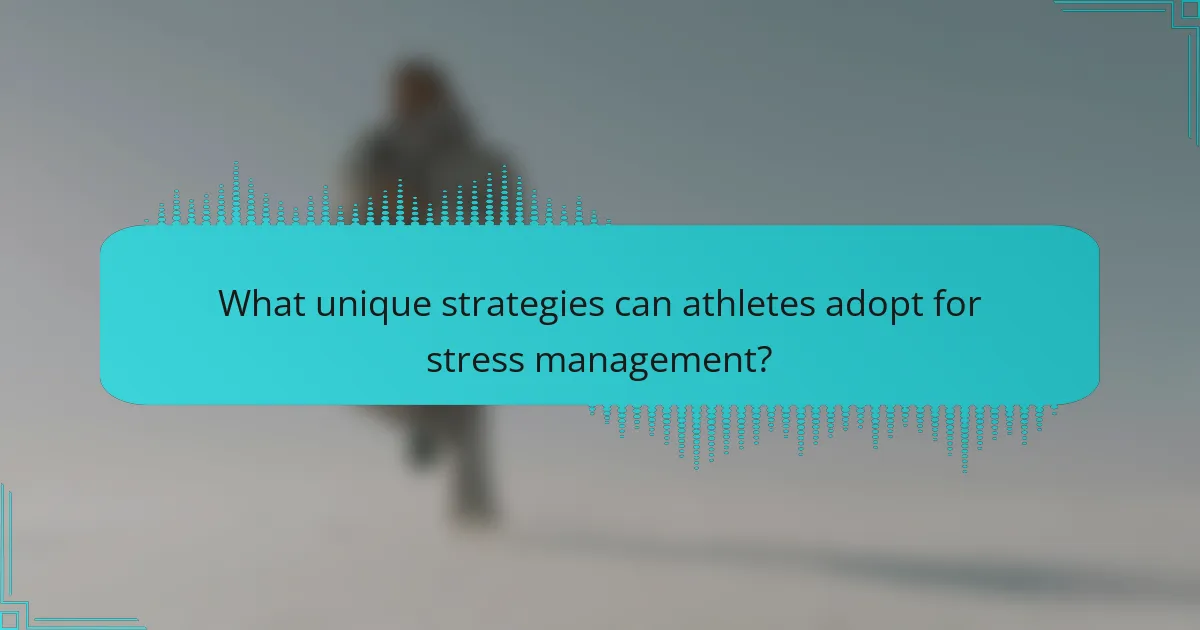
What unique strategies can athletes adopt for stress management?
Athletes can adopt unique strategies such as mindfulness techniques, structured breathing exercises, and routine physical activity to manage stress effectively. Mindfulness practices enhance mental resilience, while breathing exercises promote relaxation and focus. Regular physical activity reduces anxiety and improves mood, creating a holistic approach to stress management.
How can visualization techniques enhance performance and reduce anxiety?
Visualization techniques can significantly enhance performance and reduce anxiety for athletes. These techniques enable athletes to mentally rehearse their performance, leading to improved focus and confidence.
By creating vivid mental images of successful outcomes, athletes can condition their minds to respond positively under pressure. Research indicates that visualization can lower anxiety levels by promoting relaxation and a sense of control.
Moreover, incorporating visualization into training routines can lead to measurable improvements in performance metrics, such as reaction time and accuracy. This unique attribute of visualization makes it an essential strategy in the Protocol for Life Balance for managing stress effectively.
What are the benefits of team support in managing stress?
Team support significantly enhances stress management for athletes by fostering a sense of belonging and shared responsibility. This collective environment encourages open communication, allowing athletes to express concerns and share coping strategies. Research indicates that social support can reduce anxiety levels by up to 50%, highlighting its importance in maintaining mental well-being. Furthermore, engaging in team activities can shift focus from individual stressors to group achievements, promoting resilience. Overall, team dynamics play a crucial role in creating a supportive atmosphere that mitigates stress and anxiety.

What are rare but effective methods for coping with anxiety?
Mindfulness techniques, such as meditation and deep breathing, are rare but effective for coping with anxiety. These methods enhance focus and promote relaxation. Athletes can integrate mindfulness into their routines, improving mental resilience. Additionally, engaging in creative outlets like art or music can provide emotional release, fostering a positive mindset. Regular physical activity also serves as a unique attribute, reducing anxiety through endorphin release and improved sleep.
How can creative expression aid in stress relief?
Creative expression significantly aids in stress relief by providing an outlet for emotions and fostering relaxation. Engaging in activities like painting, writing, or music allows athletes to channel stress creatively, reducing anxiety levels. Studies show that creative activities can lower cortisol, the stress hormone, enhancing overall well-being. Additionally, these expressions promote mindfulness, helping athletes stay present and focused. By incorporating creative expression into their routines, athletes can effectively manage stress and improve their mental health.
What is the impact of alternative therapies on athletic performance?
Alternative therapies can significantly enhance athletic performance by reducing stress and anxiety. These therapies, including mindfulness, acupuncture, and yoga, promote mental clarity and emotional balance. Research indicates that athletes who incorporate these practices experience improved focus, reduced fatigue, and enhanced recovery times. A study found that athletes using mindfulness techniques showed a 20% increase in performance metrics. Additionally, alternative therapies foster a holistic approach to training, addressing both physical and psychological needs. By managing stress effectively, athletes can maintain peak performance levels throughout their training and competitions.
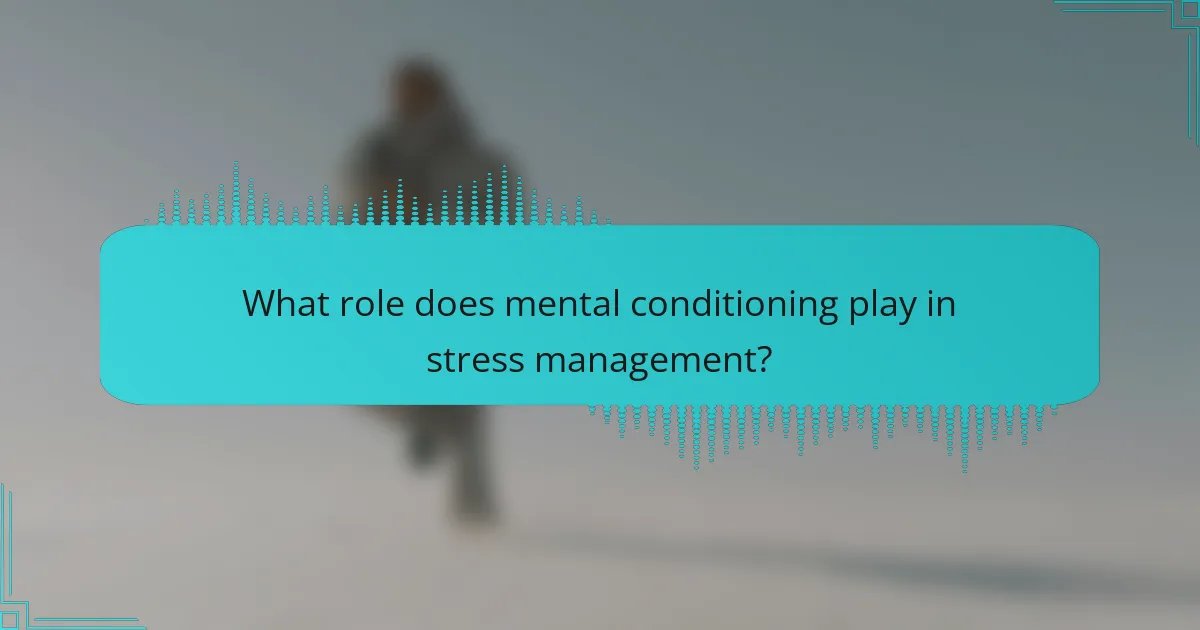
What role does mental conditioning play in stress management?
Mental conditioning plays a crucial role in stress management for athletes by enhancing focus and resilience. It equips athletes with techniques to maintain composure under pressure, thereby reducing anxiety. Effective mental conditioning strategies include visualization, mindfulness, and positive self-talk. These methods foster a proactive mindset, enabling athletes to cope with stressors efficiently. Research indicates that athletes who engage in mental conditioning report lower stress levels and improved performance outcomes. Thus, integrating mental conditioning into training regimens is essential for optimal stress management.
How can athletes develop resilience through mental conditioning?
Athletes can develop resilience through mental conditioning by implementing specific strategies that enhance their ability to cope with stress and anxiety. Techniques such as visualization, mindfulness, and positive self-talk help athletes manage their mental state during high-pressure situations.
Regular practice of mental conditioning techniques builds a strong mental framework, allowing athletes to recover from setbacks more effectively. For example, using visualization can prepare athletes for competition by mentally rehearsing their performance, fostering confidence and focus.
Additionally, incorporating mindfulness practices helps athletes stay present, reducing anxiety about future events. Research indicates that athletes who engage in mental conditioning report lower levels of stress and improved performance outcomes.
In summary, systematic mental conditioning equips athletes with the skills necessary to navigate challenges, ultimately enhancing their resilience.
What are the best practices for implementing mental conditioning?
To effectively implement mental conditioning, athletes should adopt structured strategies that focus on stress and anxiety management. Key practices include setting clear goals, using visualization techniques, and maintaining a consistent routine.
1. Establish specific mental conditioning goals that align with performance objectives.
2. Incorporate visualization exercises to enhance focus and confidence during competitions.
3. Develop a daily routine that includes mental training sessions to reinforce positive thinking.
4. Practice mindfulness techniques to stay present and reduce anxiety during high-pressure situations.
These strategies create a robust framework for athletes to enhance their mental resilience and overall performance.
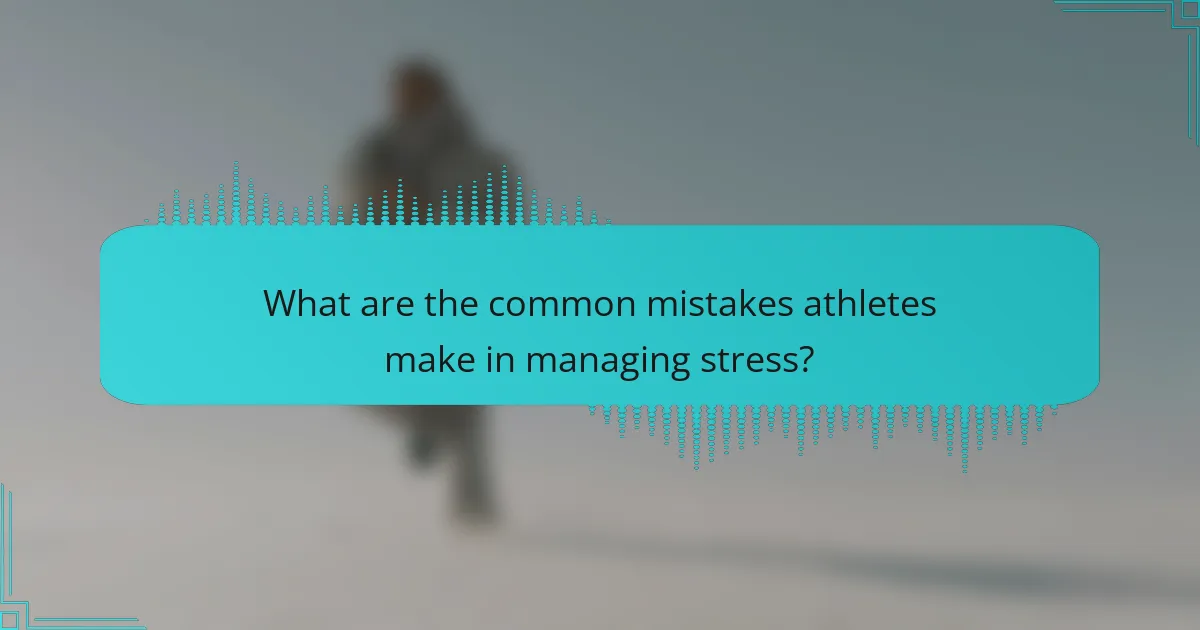
What are the common mistakes athletes make in managing stress?
Athletes often make several common mistakes in managing stress. These include neglecting recovery time, failing to seek support, and not utilizing effective coping strategies.
One significant error is underestimating the importance of rest, which can lead to burnout and decreased performance. Many athletes also avoid discussing their stress with coaches or teammates, missing out on valuable support. Lastly, relying solely on physical training without incorporating mental health practices can exacerbate anxiety.
Addressing these mistakes can enhance overall well-being and performance.
How can athletes identify and avoid burnout?
Athletes can identify and avoid burnout by recognizing signs of fatigue and implementing effective stress management strategies. Monitoring physical and mental well-being is crucial.
To prevent burnout, athletes should establish a balanced training schedule, ensuring adequate rest and recovery. Incorporating mindfulness practices can significantly reduce anxiety and enhance focus.
Regularly assessing workload and emotional state helps in adjusting training intensity. Seeking support from coaches or mental health professionals can provide valuable insights and coping mechanisms.
Lastly, prioritizing hobbies and social interactions outside of sports fosters a well-rounded lifestyle, mitigating the risk of burnout.
What are the signs that an athlete needs professional help?
An athlete may need professional help if they exhibit persistent mood changes, withdrawal from social interactions, or a decline in performance. Signs include increased anxiety, changes in sleep or appetite, and difficulty concentrating. Recognizing these indicators early can prevent further issues and support mental well-being.

What expert insights can enhance stress management for athletes?
Expert insights for athletes emphasize tailored stress management techniques, focusing on mental resilience and recovery strategies. Techniques such as mindfulness, visualization, and structured breathing can significantly enhance performance. Research shows that athletes practicing mindfulness report lower anxiety levels, improving overall focus. Incorporating regular mental health check-ins and professional support can further solidify an athlete’s mental balance. Another unique aspect is the importance of social support networks, which provide emotional reinforcement during high-pressure situations.
What are the top recommendations from sports psychologists?
Top recommendations from sports psychologists include developing a consistent mental routine, practicing mindfulness techniques, setting realistic goals, and maintaining a balanced lifestyle. These strategies help athletes manage stress and anxiety effectively. Regular visualization exercises enhance performance by fostering a positive mindset. Additionally, engaging in open communication with coaches and peers builds a supportive environment. Consistent self-reflection allows athletes to adapt and refine their mental strategies over time.
How can athletes create a personalized stress management plan?
Athletes can create a personalized stress management plan by identifying their unique stressors and developing coping strategies. Start by assessing individual stress triggers and responses. Incorporate techniques such as mindfulness, physical activity, and time management. Regularly review and adjust the plan based on effectiveness and changing circumstances. Engaging with a sports psychologist can provide tailored strategies and support.
What key elements should be included in the plan?
A comprehensive plan for managing stress and anxiety in athletes should include strategies targeting mental resilience, relaxation techniques, goal-setting, and support systems. Key elements are:
1. **Mental Resilience Training**: Techniques like visualization and positive self-talk enhance coping mechanisms.
2. **Relaxation Techniques**: Practices such as deep breathing, meditation, and yoga reduce physiological stress responses.
3. **Goal-Setting Framework**: Establishing SMART (Specific, Measurable, Achievable, Relevant, Time-bound) goals fosters focus and motivation.
4. **Support Systems**: Building a network of coaches, peers, and mental health professionals provides essential emotional support.
How can athletes track their progress in managing stress?
Athletes can track their progress in managing stress by implementing a structured protocol that includes regular self-assessment, journaling, and utilizing stress management tools. Regular self-assessment allows athletes to evaluate their stress levels and coping strategies, while journaling helps document thoughts and feelings, providing insights into patterns. Additionally, tools such as mindfulness apps or biofeedback devices can offer real-time data on stress responses, enabling athletes to adjust their techniques accordingly. Consistent tracking of these elements leads to improved mental resilience and performance.
